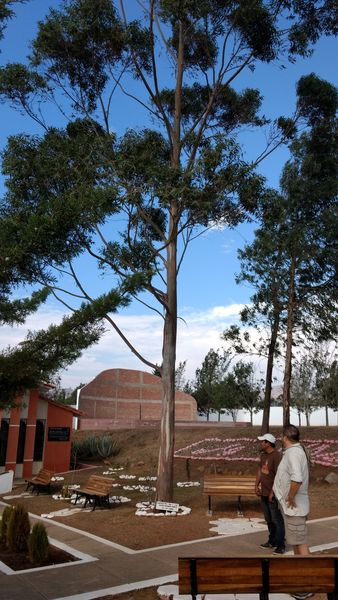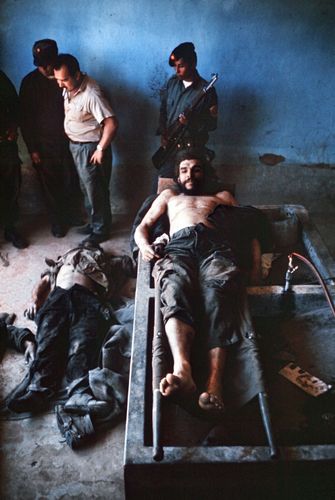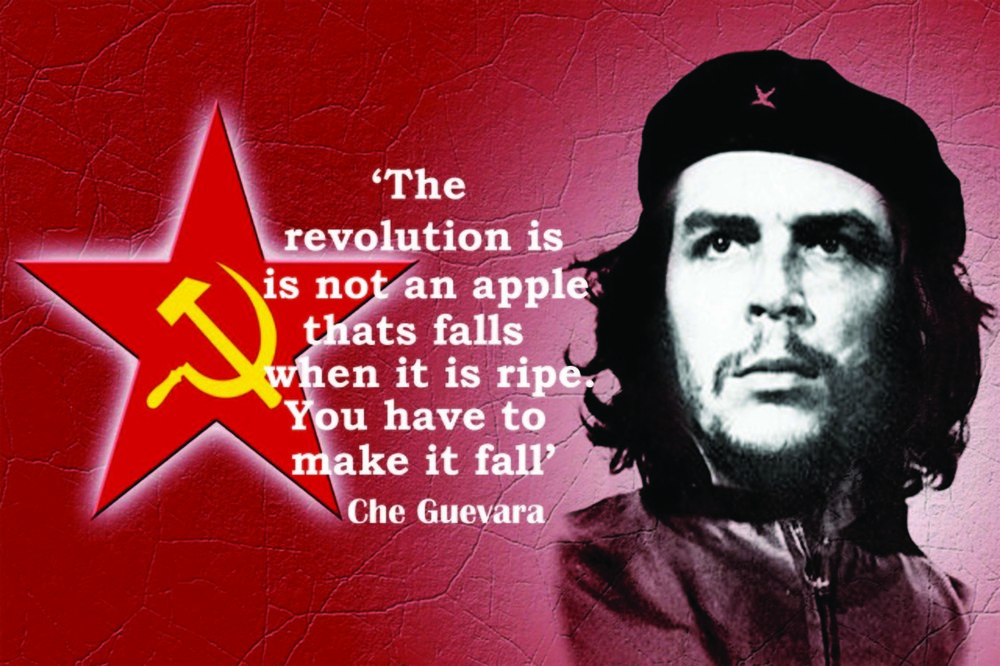
格瓦拉常現身於傳記、回憶錄、文章、紀錄片、歌曲及電影的題材,其共同想像普遍呈現兩極化,有理想主義色彩的人會認為他是為改革而生的戰士,主流保守派則認為他只是不顧一切的魯莽反抗者。《時代》雜誌將格瓦拉選入二十世紀百大影響力人物],並登上阿爾韋托·科爾達為他拍攝、命名為《英勇的游擊隊員》的照片,被美譽為「世上最知名的照片」。

切·格瓦拉(西班牙語:Che Guevara;1928年6月14日-1967年10月9日1]),本名埃內斯托·格瓦拉(Ernesto Guevara),暱稱切(El Che或Che),出生於阿根廷。他是古巴革命的核心人物之一,社會主義古巴、古巴革命武裝力量和古巴共產黨的主要締造者及領導人,著名的國際共產主義革命家、軍事理論家、政治家、醫生、作家、游擊隊領袖.
六月14日是切·格瓦拉的生日, 寡頭政權違反了它的承諾, 打破"民主"的可見度-直接攻擊人民, 而在正常情況下, 它更傾向於使用用來維持壓迫的上層結構工具. 又出現了一個問題: 該怎麼辦? 我們回答: 暴力不是剝削者的特權, 被剝削也有同樣的權利. 此外, 在某些歷史時刻, 他們必須訴諸這項權利. 馬蒂說罪犯和助長戰爭, 是可以避免的, 以及避開戰爭不可避免的戰爭的人"
4 июня — день рождения Че Гевары.
«…Олигархия нарушает взятые ею на себя обязательства, порывает с видимостью «демократии» — и прямо атакует народ, в то время как в обычных условиях она предпочитает прибегать к надстроечным инструментам, используемым для поддержания угнетения. И вновь встаёт вопрос: что делать? Мы отвечаем: насилие не является привилегией эксплуататоров, эксплуатируемые имеют такое же право на него. Более того, в определённые моменты истории они обязаны прибегнуть к этому праву. Марти сказал: «Преступник и тот, кто разжигает войну, которой можно избежать, и тот, кто уклоняется от войны, ставшей неизбежной»
Ernesto "Che" Guevara (/tʃeɪ ɡəˈvɑːrə/;] Spanish: [ˈtʃe ɣeˈβaɾa];[] 14 June 1928] – 9 October 1967) was an Argentine Marxist revolutionary, physician, author, guerrilla leader, diplomat, and military theorist. A major figure of the Cuban Revolution, his stylized visage has become a ubiquitous countercultural symbol of rebellion and global insignia in popular culture.[
As a young medical student, Guevara traveled throughout South America and was radicalized by the poverty, hunger, and disease he witnessed.[] His burgeoning desire to help overturn what he saw as the capitalist exploitation of Latin America by the United States prompted his involvement in Guatemalas social reforms under President Jacobo Árbenz, whose eventual CIA-assisted overthrow at the behest of the United Fruit Company solidified Guevaras political ideology. Later in Mexico City, Guevara met Raúl and Fidel Castro, joined their 26th of July Movement, and sailed to Cuba aboard the yacht Granma with the intention of overthrowing U.S.-backed Cuban dictator Fulgencio Batista.[9] Guevara soon rose to prominence among the insurgents, was promoted to second in command and played a pivotal role in the victorious two-year guerrilla campaign that deposed the Batista regime.[
Guevara remains both a revered and reviled historical figure, polarized in the collective imagination in a multitude of biographies, memoirs, essays, documentaries, songs, and films. As a result of his perceived martyrdom, poetic invocations for class struggle, and desire to create the consciousness of a "new man" driven by moral rather than material incentives,] Guevara has evolved into a quintessential icon of various leftist movements. In contrast, his ideological critics on the right accuse him of authoritarianism and sanctifying violence against his political opponents. Despite disagreements on his legacy, Time magazine named him one of the 100 most influential people of the 20th century,[] while an Alberto Korda photograph of him, titled Guerrillero Heroico (shown), was cited by the Maryland Institute College of Art as "the most famous photograph in the world".[]
有資料顯示出是古巴頭子卡斯楚手下,被美國收買,透露出切格瓦拉在玻利維亞的確實位置,否則他不會被暴露出行蹤而被圍剿捕獲?
1967年10月8日,格瓦拉被美國訓練的玻利維亞部隊抓獲;10月9日,格瓦拉被處決,年僅39歲。
傳奇:切·格瓦拉被處決後,1967年10月10日,當局將他的遺體送到一個醫院內公開展示。
格瓦拉遺體的公開示眾,成為國際媒體的熱點報道,反而使他放棄優裕家庭和職業投身國際共產革命的故事廣為人知。
玻利維亞當局其後將他的遺體埋葬在一個秘密地點,直到1997年才經過多國聯合挖掘,送回到古巴修建的格瓦拉陵園內下葬。
多年來,格瓦拉的名字成為"革命"、"社會主義"、"共產主義"的同義詞。
支持者說,他是英勇的游擊戰士,是為信仰奮鬥獻身的英雄, 有為全人類自由拋頭顱灑熱血的國際主義浪漫情懷。
儘管他身後53年仍爭議不斷,但他已經成為國際間廣為流行的一個文化象徵。
格瓦拉的肖像不僅出現在壁畫、遊行、音樂會、海報等各種公共場合,也成為T恤衫、郵票、杯子、鑰匙鏈、皮帶、棒球帽等許多商品上的圖案。
對很多人而言,他已經超越了為窮人謀利益的革命英雄範疇,成為當代的一個神話和偶像。
人民英雄 "Che" Guevara 92歲冥誕也是被美國.CIA殺害53週年紀念.
殘忍的CIA.命令玻利維亞政府將"Che" Guevara ,雙掌斬下送到美國化驗比對指紋,確認無誤美國才宣告"Che" Guevara, 死亡消息..
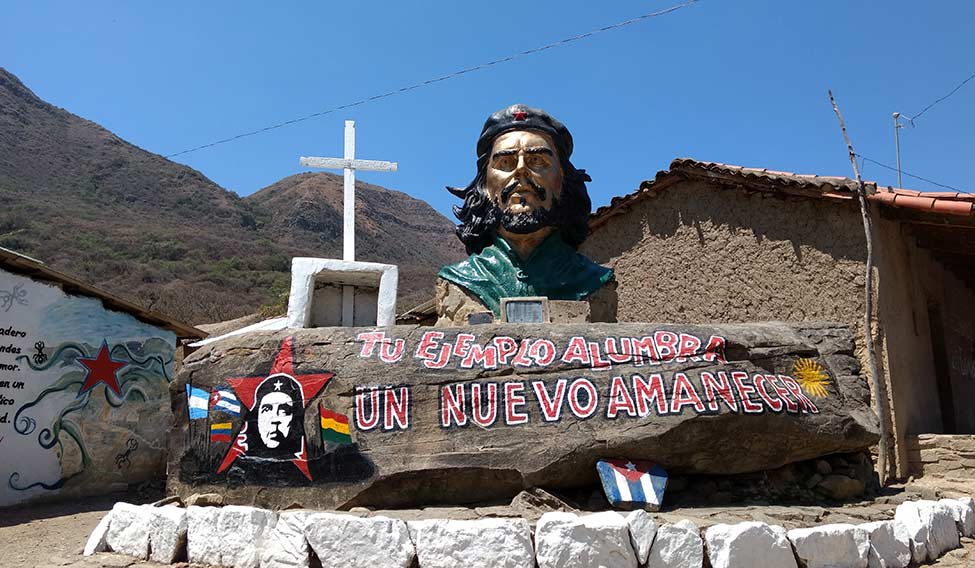
The Doctors last operation. Remembering Che Guevara on his 92th birth anniversary.
Julia Cortez was having lunch when she heard the gunshots that killed her appetite. The events of the day in the impoverished village of La Higuera, in the Andes mountain ranges of Bolivia, had been so exciting for the 19-year-old trainee teacher that her mother had to force her to eat.
Those eyes.Felix Ismael Rodriguez, the Cuban tasked by the CIA to coordinate intelligence inputs, had earlier looked into those eyes and felt a sense of admiration for the man he had been trying to track down since June 1967. Rodriguez’s father had been a senior official in the Fulgencio Batista regime of Cuba, and his family was hounded after Fidel Castro came to power on January 1, 1959. Many of his relatives were killed, and the man who stood before him had personally led the executions.
Rodriguez had also been in the CIA-trained Brigade 2506, which was involved in the Bay of Pigs invasion of Cuba in April 1961, a spectacular failure thanks partly to US reluctance to give air support to the Cuban volunteers. Rodriguez then sought sanctuary in an embassy and returned to the US. The failure only stoked the embers of anger that had made him attempt the daredevil mission.
“He turned white,” Rodriguez recalled on Che’s 46th death anniversary. “And said, ‘It is better this way. I should never have been captured alive.’” By then news had spread that Che had died of combat wounds. A woman told Rodriguez that radio channels have been reporting the death.
Che’s mission in Bolivia was doomed from the beginning, thanks to the noncooperation of the Bolivian communist party and the public. The Soviet Union was also unhappy. Soviet President Leonid Brezhnev dispatched his premier Alexei Kosygin to Havana in June 1967 to take up the matter with Fidel. According to a CIA report, Fidel explained his position to Kosygin and the Cubans considered the visit productive.
Che had been a thorn in USSR-Cuba relations since Fidel came to power. As a key functionary in the government, Che favoured centralisation and leaned towards the Chinese model of development pioneered by Chairman Mao. A CIA memorandum dated October 18, 1965, noted that Che was a marked man from the time he positioned himself against the practical policies recommended by the Soviet Union regarding Cuba’s economic development.
- 3樓. red square 1232020/06/16 18:54The visit by the Cuban delegation at the time did not go unnoticed in Mainland China. Dimon Liu was born in China and immigrated to the United States in 1965. She wrote about her early experiences growing up in the midst of the Great Leap Forward in 2017 and her first encounter with Cuba while still in China.
It was 1960, the height of famine during the years of Great Leap Forward. I was a child living in the southern city of Guangzhou in China. Meal time meant a little rice, and whatever we could scrape together. For nearly two years, we had no meat, fish or even cooking oil. We were starving.
All of a sudden, there was cane sugar from Cuba, and we school kids had to learn Cuban songs. We had been on rations even before the Great Leap Forward which began in 1958. Thirty jin (one jin is about 1.1 pound) of grains per month for an adult, and fifteen jin for a child above the age of seven. Two jin of meat and two ounces of cooking oil, also for a month. [...] People on our streets were dying of many infectious diseases, though no one dared to say anyone died of hunger
- 2樓. red square 1232020/06/16 18:50
 red square 123 於 2020/06/16 18:53回覆
red square 123 於 2020/06/16 18:53回覆 - 1樓. reaizuguo*😻詩韻映時事2020/06/16 09:48切·格瓦拉拜訪他的偶像
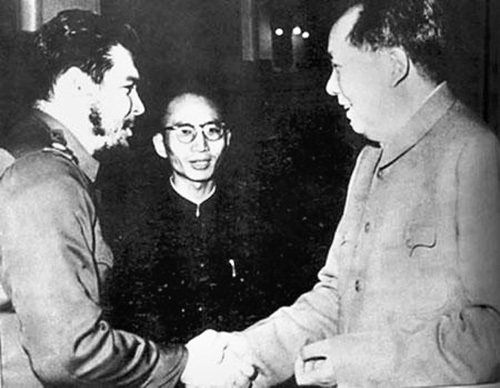
1960年11月19日,毛澤東在中南海會見切·格瓦拉。Thankys, THE Che Guevara met Mao.Comrade Che Guevara and Chairman Mao met in China in a diplomatic meeting of global communist delegation in Zhongnanhai, China. They held discussions over many topics including the domestic situation in Cuba, especially the economic situation (for example: sugar sales); American influence and counter-revolutionaries; and comparison to the domestic situation in other Latin and Central American countries, such as: Peru, Colombia, Brazil, etc.).Here is a part of the transcript of the conversation between the communist delegates from Cuba and their Chinese counterparts in which Comrade Che and Chairman Mao are talking about several economic and international issues.
Premier [Zhou Enlai]: vs Che Guevara .Chairman [Mao Zedong]: Cuban Delegation, welcome.
red square 123 於 2020/06/16 18:45回覆
 .
.



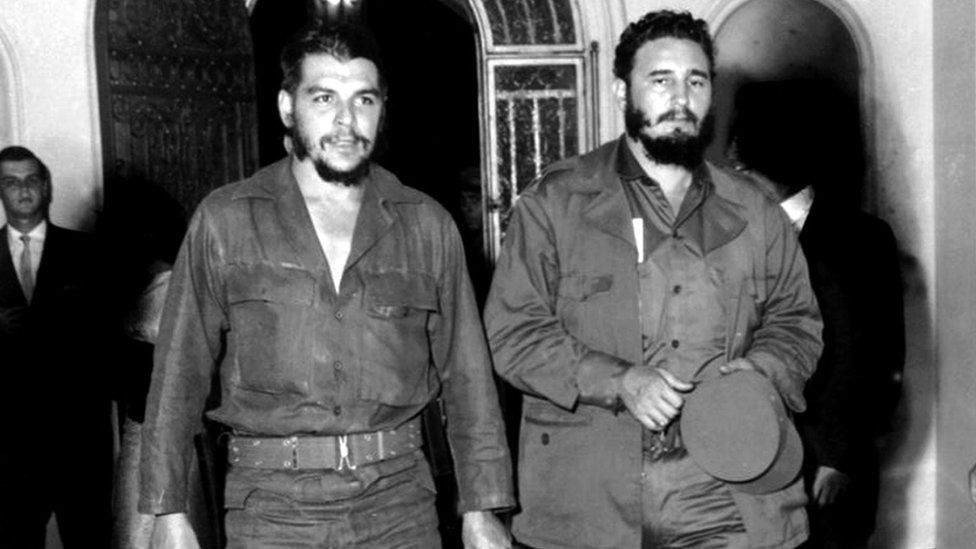

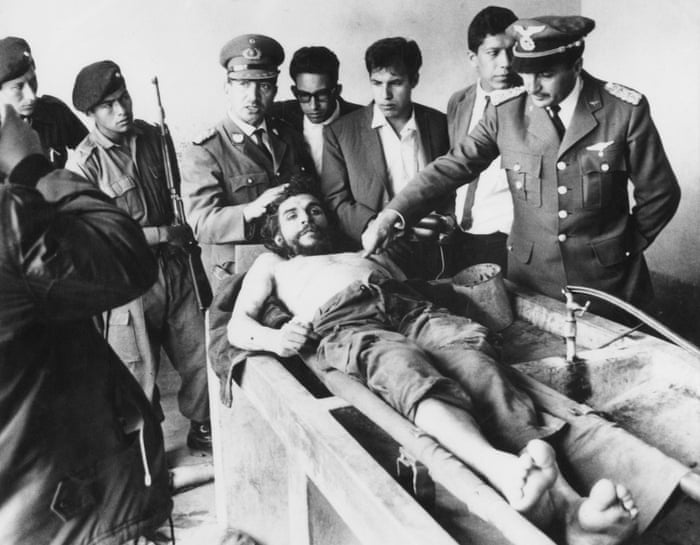 .
.


